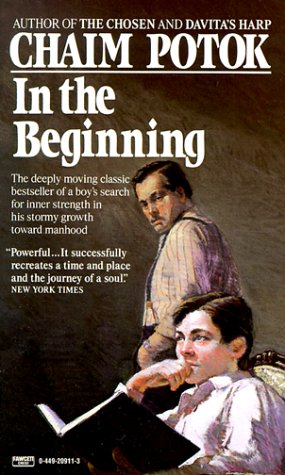Reviewed by Briana @ Pages Unbound on
In the Beginning differs from some of Potok’s other novels in that the narration switches seamlessly between past and present, smearing together time. This is a literary style I do not always like, as I think it is often unnecessary and therefore can come across as pretentious, but Potok makes it work. It fits the story, as David attempts to explain the origins of his people and his beliefs, how his past is so strongly connected to his present and his future. In the Beginning, then, though different in style from many Potok books, exudes the same heart and understanding of human nature that make Potok a true master.
David starts the novel as a sickly child, weak and often afraid, particularly of that which he does not understand. His voice, to me, sometimes comes across as odd: too adult and yet so naïve at once. He’ll frequently tell others (close to him) about his emotions, that he’s afraid or that “It was a really bad feeling.” David, however, is supposed to be a bit of an oddball character, a child with a big brain he does not necessarily know how to use. Adults credit him with understanding more than he lets on. So, while young David is a bit strange, he grows throughout the novel, slowly coming into his own—and slowly losing his openness when he learns what it can cost him.
The book will draw to mind, a little, My Name Is Asher Lev, as David also struggles with wanting to learn and do and understand things his community thinks best not to be understood. The theme here is more educational and intellectual attainment, rather than art, and it’s perhaps less at the forefront. The protagonist’s struggles are comparable, however. Strangely, though I love Potok’s works, I have never done biographical research on him. Yet In the Beginning strikes me as clearly autobiographical, and I think I begin to understand some of what Potok must have lost—and gained—while pursuing his own writing career and his own search for truth.
Potok’s works, in general, are quite readable to those readers without much knowledge of Judaism, though I think In the Beginning gives somewhat fewer context clues for terms than Potok’s other novels. It’s nothing a quick Google search will not be able to readily resolve for a reader, however. This story also relies a bit on the reader’s knowledge of history, but only in very broad terms. David lives through the Great Depression, though the term is never used and child Davis is only vaguely aware that many family have money problems; readers have to fill in the gaps. A bit of the same ambiguity is applied to the description of WWII, though the novel gets gradually more explicit (which, admittedly, is historically accurate; David’s family is shocked by what the newspapers reveal at the war’s end).
Potok’s work is always deeply personal while also offering profound insight into humanity at large. Others of Potok’s novels are closer to my heart, but In the Beginning is certainly a masterpiece in its own right and well worth the read. I’m sorry I took this long to get around to it.
Reading updates
- Started reading
- 14 September, 2016: Finished reading
- 14 September, 2016: Reviewed
